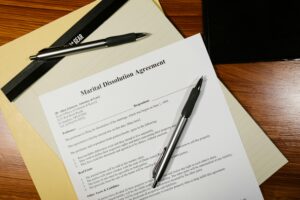By: Gregg Woodnick, Markus Risinger

As surprising as it might sound, “returning” an adopted child to the state’s care happens more often than you imagine. To give one example, followers of a “Youtuber” family noticed that their adopted son from China was not being shown in any of their videos or social media posts. Later, the family uploaded a video where they discussed that they “rehomed” their adopted son saying that his special medical needs were beyond what they could provide for him.[1]
Building adopted families is a dream for many people. Perhaps adoption is a choice in the wake of fertility challenges, a relative is unable to care for their own child through DCS, or perhaps your vision of building your family has always meant adopting. After all, there are far too many children who need loving homes.
Unfortunately, although well-publicized situations such as the adoptive mother of a Russian child who, after a few years of challenges, put him on a plane and sent him back to Russia (causing international review of Eastern European adoption practices) are rare, what is not rare but seldom discussed is the volume of children who are adopted out of challenging situations.
Despite efforts from their adoptive parents, these children sometimes end up back in foster care. It is often difficult to reconcile the idea that well-intentioned adoptive parents, who dedicate themselves and their resources to nurturing a child, are not ‘fixing’ the underlying issue for some children. These children usually require intensive therapy to cope with problems that arose long before the adoption. Sometimes, the child lashes out, and even with the best of therapies and interventions, the child’s behavior unravels the family.
In international contexts, as referenced with the Russian child, there are language and cultural barriers. Sometimes, although a child may be adopted at a younger age, adoptive parents may not have full disclosure regarding the child’s history. This is especially concerning when adopting a child who may have been abused and has not received adequate treatment.
In another case, after adopting two children from Russia, a couple from Long Island requested that the judge vacate the adoption because the children were found to have “serious medical and psychiatric problems” and even went as far as threatening to kill their adoptive parents.[2] The children were later placed in the care of a mental health institution.[3] In Tennessee, another adoptive parent placed her adopted son on a plane back to Russia, alone, claiming that he had “violent and severe psychopathic issues.”[4]
Some people may believe that these issues inure to foreign adoptions only, but they would be wrong. Domestic adoptions pose just as many perils and because they are entirely more common, the prevalence of adoptive home disruptions is significant, although rarely discussed.
For example, adoptions that involve children who have been raised in foster care may disrupt their adoptive families long after the decree is entered. Children raised in foster care may have unresolved mental health or behavioral issues, such as reactive attachment disorder, learning disabilities, sexual aggression, and other mental health problems, that arise months or years later.[5] Adoptive parents tend to believe that by nurturing these children, they will be able to resolve these concerns.
Unfortunately, the years of social, emotional, and cognitive deficiencies that have traumatized these children require more than just nurturing. Some children are never able to adjust and bond with their new families and instead act out against them. This is known as reactive attachment disorder (RAD), and it usually occurs due to abuse and neglect in the child’s earlier years of life.[6] Unfortunately, some adoptive parents do not account for issues such as those listed above and quickly realize that they cannot financially, emotionally, or physically continue to care for the children.[7] Another Arizona couple had to sign away their parental legal rights to their adopted son after encountering multiple incidents that were very concerning and potentially dangerous. The child was diagnosed with RAD and sociopathic tendencies and, according to the mother, completed three behavioral health intakes at Phoenix Children’s hospital and spent 16 months in a therapeutic foster home.[8]
Overall, 3-10% of the adoptions involving foster children with these issues end in dissolution of the adoption.[9] These children often are returned to the same system from which they were adopted. Their adoptive parents have to make the difficult decision to surrender the child back into state care because they are now the ones incapable of providing care for the child.
Yes, those well-intentioned adoptive parents call DCS and ask them to take their child back into state custody. Sometimes this happens in a criminal setting where the adopted child, now a young teenager, is arrested for harming another child (perhaps a friend or a sibling). In this scenario, how can the adoptive family supervise their adopted child around siblings or acquaintances 24 hours per day?
Even if no arrest has been made, adoptive parents may “return” the adopted child back to the state if they exhibit aggressive behavior. In 2014, adoptive parents in Ohio took their adopted son to the local child services agency after he displayed aggressive behavior and threatened the family.[10] They adopted the child when he was 3 months old and then “returned” him back to the state when he was 9 years old.[11]
The notion of a surrender dependency, meaning that the parents together ask the court to take custody of the children, is relatively rare – but it happens. The purpose of most protective statutes in Arizona provide parents this opportunity to seek temporary or permanent court supervision and state assistance with their adopted child. Although states have come a long way with safe harbor provisions for natural parents of newborns (newborns can be left at some hospitals and fire stations by parents who cannot care for them), adoptive parents are typically left with seeking juvenile court intervention (and often strong opposition from the state).
This article is not meant to scare individuals looking to adopt – quite the contrary, as the majority of adoptions are straightforward and end in wonderful healthy bonding relationships between the children and their adoptive parents. However, there are risks to adoption that need to be carefully taken into consideration by individuals who intend to adopt. Without doing so, it can lead to situations similar to what the Youtube family experienced. Many adoptive parents have had to deal with “broken” adoptions. This is precisely why it is important to share the experience and support other adoptive parents. Most importantly, parents of adoptive children need to know that they are not alone in making these difficult choices.
[1] https://www.buzzfeednews.com/article/stephaniemcneal/myka-stauffer-huxley-announcement
[2] http://www.huffingtonpost.com/mirah-riben/when-adoptions-fail_b_6064246.html
[3] Id.
[4] Damien Cave, At a Family’s Home in Tennessee, Reminders of a Boy Returned to Russia, N.Y. Times, Apr. 11, 2010, at A16.
[5] http://www.nacac.org/adoptionsubsidy/factsheets/childsupportenforcement.html
[6] http://abcnews.go.com/GMA/Parenting/return-adopted-child-advice-parents-international-adoptions/story?id=10360247
[7] Dawn J. Post & Brian Zimmerman, The Revolving Doors of Family Court: Confronting Broken Adoptions, 40 Cap. U.L. Rev. 437, 438 (2012)
[8] https://www.azfamily.com/news/original_reporting/impossible-ultimatum-arizona-family-forced-to-give-up-son-to-get-him-help/article_58292ab4-0fdb-11ea-a5eb-3f3b45531ac6.html
[9] http://www.nacac.org/adoptionsubsidy/factsheets/childsupportenforcement.html
[10] https://www.usatoday.com/story/news/nation/2014/02/20/couple-abandoned-son-declared-dependent/5634933/
[11] https://goodmenproject.com/families/returning-adopted-child-wwh/
Gregg Woodnick has been practicing law in Arizona for over 20 years. He is a former adjunct law professor and has lectured for Yale University, Midwestern College of Osteopathic Medicine, Arizona State University and Northern Arizona University.
Markus Risinger joined Woodnick Law as a law clerk in 2012. Markus graduated cum laude from the Sandra Day O’Connor College of Law at Arizona State University.
Deborah Lee is a former law clerk at Woodnick Law and a graduate of the Sandra Day O’Connor College of Law at Arizona State University.


